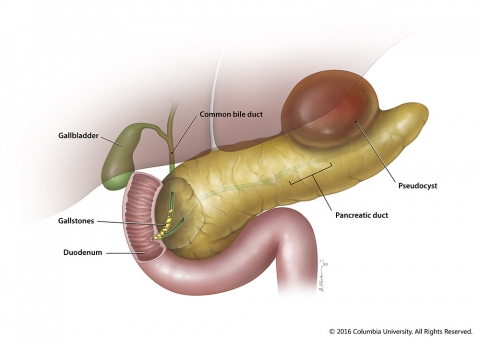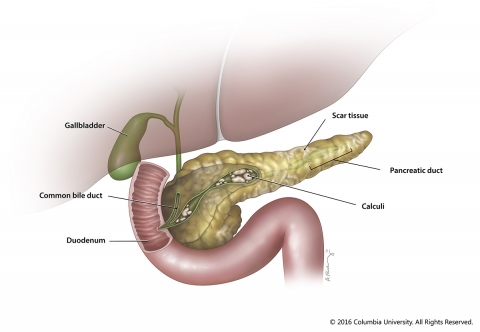Guide to Pancreatitis
On Page Nav:
Reviewed by the physicians of Columbia’s Pancreatic Surgery Team, October 2024
Overview | Causes | Genetics | Symptoms | Diagnosis | Treatment | Auto Islet Transplants | Diet | Prognosis | FAQ
What is Pancreatitis?
Pancreatitis is inflammation of the pancreas that occurs when pancreatic enzyme secretions build up and begin to digest the organ itself. It can occur as acute, painful attacks lasting a matter of days, or it may be a chronic, condition that progresses over a period of years.
Acute vs. Chronic Pancreatitis
Acute pancreatitis refers to pancreatitis that develops suddenly, most often as a result of gallstones or alcohol ingestion. Reaction to certain medications, trauma, and infectious causes can also lead to acute pancreatitis. Acute pancreatitis can be life threatening, but most patients recover completely.
Chronic pancreatitis refers to ongoing disease in which the pancreas continues to sustain damage and lose function over time. The majority of cases of chronic pancreatitis result from ongoing alcohol abuse, but some cases are hereditary or due to diseases such as cystic fibrosis.
Approximately 87,000 people are treated for pancreatitis each year in the U.S., with the disease affecting roughly twice as many males as females. Occurring very rarely in children, pancreatitis primarily affects adults.
Symptoms of Pancreatitis
Symptoms of acute pancreatitis include:
- Severe, steady pain in the upper-middle part of the abdomen, often radiating into the back
- Jaundice
- Low-grade fever
Causes of Pancreatitis
In more than half of patients, chronic pancreatitis is caused by long-term abuse of alcohol, which leads to damage and scarring of the pancreas. Other people may develop chronic pancreatitis as a result of hereditary causes and other causes, including:
- Gallstones
- Structural problems of the pancreatic and bile ducts
- Some medications like estrogen supplements and some diuretics
- Severe viral or bacterial infection
Treatment for Pancreatitis
Treatment for acute pancreatitis may include nutritional support with feeding tubes or intravenous (IV) nutrition, antibiotics, and pain medications. Surgery is sometimes needed to treat complications. More about pancreatitis treatments »
Schedule an Appointment with the Pancreatitis Program today.
Next Steps
If you or someone you care for is dealing with pancreatitis, the Pancreas Center is here for you. Whether you need a diagnosis, treatment, or a second opinion, we have a dedicated Pancreatitis Program ready to help.
Call us at (212) 305-9467 or use our online form to get in touch today.
To keep learning about pancreatitis
Overview | Causes | Genetics | Symptoms | Diagnosis | Treatment | Auto Islet Transplants | Diet | Prognosis | FAQ
Related Services
Related Topics
- Pancreatic Cancer
- Pancreatic Cysts
- Pancreatectomy
- Chemotherapy for Pancreatic Cancer
- Endoscopic Treatment for Pancreatic Disease
- Non-Invasive Tests for Pancreatic Cancer
- Palliative Procedures
- Surgery for Pancreatic Cancer
- Whipple Procedure (Pancreaticoduodenectomy)
- Total Pancreatectomy with Autologous Islet Cell Transplantation
See all Related Topics »
This content has been created by Columbia’s Health Guide Team. Learn more about our efforts to bring you the clearest, most accurate, and most human health resources available.


